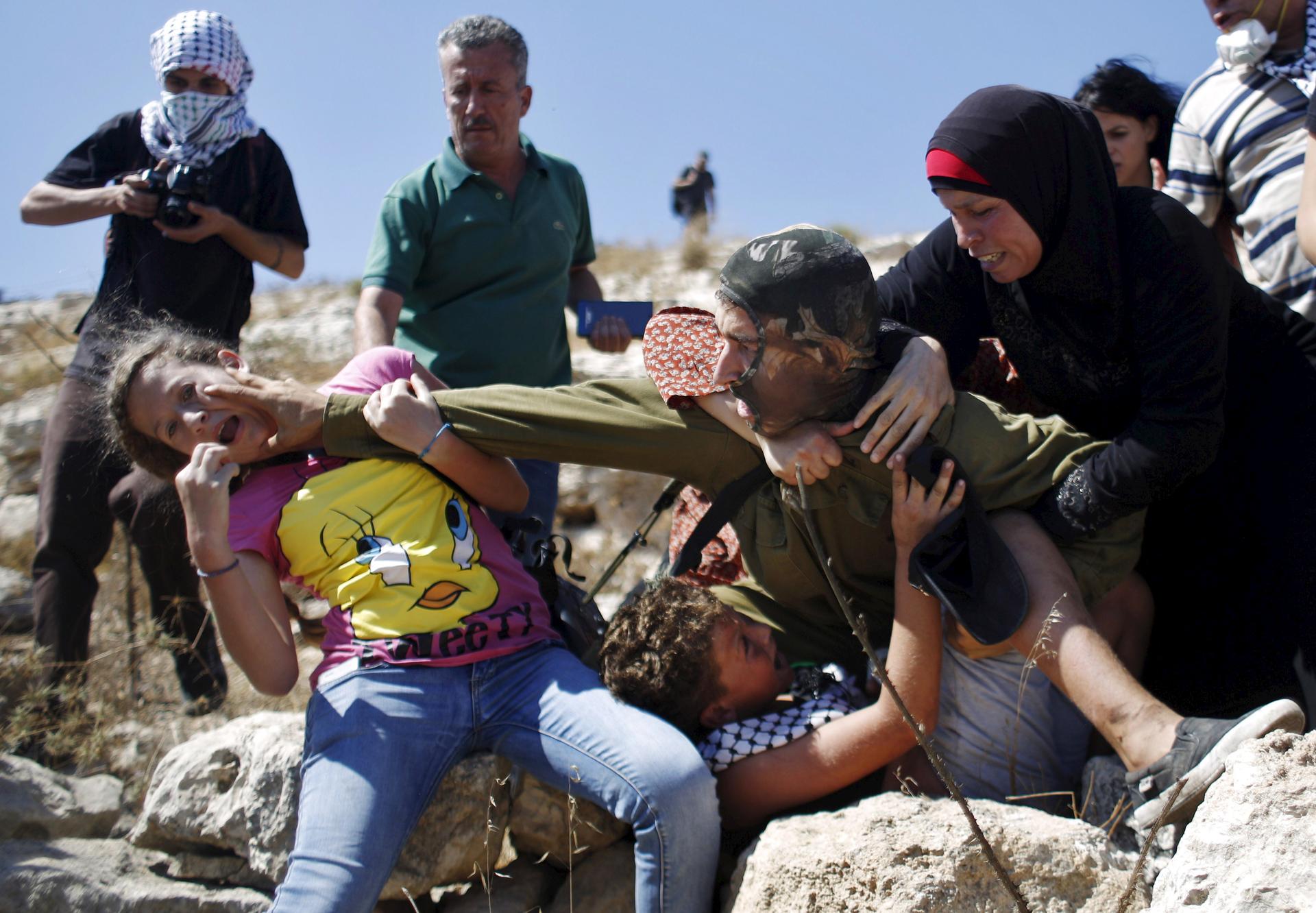‘The Third Intifada…will be a kind of personal one’
Palestinians scuffle with an Israeli soldier as they try to prevent him from detaining a boy during a protest against Jewish settlements in the West Bank village of Nabi Saleh, near Ramallah August 28, 2015.
Violence between Israel and Palestine is on the rise once again. Since October 1, a handful of Israelis have been stabbed in Jerusalem and hundreds of Palestinians, including civilians, have been wounded or killed by Israeli forces.
The violence has prompted Israel to call up additional security forces and consider measures to make it easier for Israeli civilians to get firearms. It all comes after a period of relative calm in the region — it's been more than a year since Palestinian civilians have died in Israeli military attacks.
“I’m not optimistic at the moment,” says Martin Indyk, former US ambassador to Israel and vice president and director for foreign policy at the Brookings Institute. “I’m deeply worried about the way in which a number of elements are coming together to create an escalating level of violence, and a new type of violent direction. I’m afraid it presages a Third Intifada.”
If there is a Third Intifada, which Indyk describes as a prolonged Palestinian rebellion against Israel, it will likely take a new form.
“The Third Intifada — if it’s appropriate to call it that, it’s still a bit early to determine — it will be a kind of personal one, rather than the kind of organized terrorist attacks and Israeli retaliation that marked the Second Intifada,” he says. “I say that because of the incidents of personal violence, using knives and daggers by Palestinian youth, combined, of course, with demonstrations. It’s an engagement on a very personal level.”
To wound or take someone’s life with a knife is a deeply personal act, and, when taken together with social media videos that show the conflict in real time, Indyk says a potential Third Intifada will have a deeply human element, both in terms of combat and coverage.
“I don’t think there’s a strategy or guiding hand here,” he says. “[During] the First and Second Intifadas, there wasn’t one there either. What marked those two, and we may be witnessing a third, is the spontaneity of the rebellion. … That’s what you have here. In all three cases, the individuals — and it’s young people — have decided that they’ve had enough and went for it.”
While young people historically led the First and Second Intifadas, Indyk says Palestinian leadership tried to take advantage of the momentum these events created.
“Particularly [Yasser] Arafat in both cases sought to catch up to it and ride the tiger,” he says. “Abu Mazen, the leader of the Palestinians, did his best to stop the Second Intifada and has since then been preaching nonviolence.”
Indyk says that while Mazen, better known in the West as Mahmoud Abbas, has been preaching non-violent civil disobedience and cracking down on Hamas. The Palestinian leader is concerned that he might be overtaken.
“I think he’s very worried that, just as across the Arab world in what became known as the Arab Spring, there’s a potential here that young Palestinians will turn on him,” says Indyk. “He’s very worried about that. I don’t think there’s a strategy there.”
But it’s not just the Palestinians that may push things to the brink.
“You have a whole series of Israeli vigilantes who have been operating, particularly in the West Bank,” Indyk says. “We’ve seen how extreme they can be — the burning of a family in their home, the killing of young Palestinian children and teenagers, and the burning of olive trees, and so on. They’re, in a sense, outlaws who believe in taking the law into their own hands, and that can exacerbate the whole thing.”
As of now, Indyk doesn’t believe there is a viable path forward for the two groups.
“There is no hope for a political resolution,” he says.
This story first aired as an interview on PRI's The Takeaway, a public radio program that invites you to be part of the American conversation.
Every day, reporters and producers at The World are hard at work bringing you human-centered news from across the globe. But we can’t do it without you. We need your support to ensure we can continue this work for another year.
Make a gift today, and you’ll help us unlock a matching gift of $67,000!
